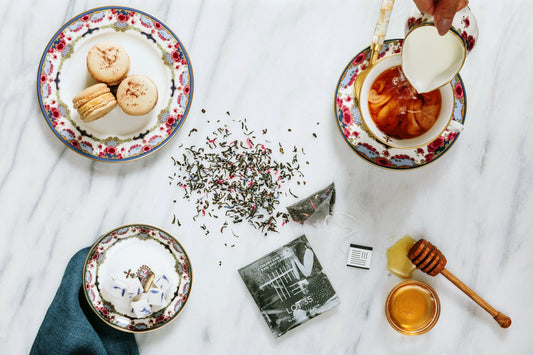Milk, lemon or sugar? When to sweeten and when not to.

There are more than 20,000 types of tea for tea lovers to savor. So it stands to reason that even the most sophisticated world traveler might have questions about the best ways to enjoy them.
Much depends on the interplay between the type of tea and accompaniments such as sweeteners, lemon and milks. Here we guide you on the best enhancements for tea.
How to Serve Tea
Let’s start with the basics. If the table isn’t already set, bring the tea to the table in a pot on a tray, along with the necessary tea accessories.
Give your guests several types of tea to choose from, as well as a selection of accompaniments, including different types of sweeteners and milks, to suit each tea variety and personal preference. Arrange each setting with beautiful china and serving pieces, including a teaspoon, teacup, saucer and a small plate for sandwiches or pastries.
Before filling your teapot with tea, fill it with boiling water and empty it before pouring the hot water over the tea. This will help your tea stay hotter longer. When serving, lift the teacup to the pot to pour the tea for each guest.
How to Sweeten Tea
When brewing tea, use a tea timer to avoid over-brewing which results in a bitter cup of tea. Guests can be tempted to over-sweeten a bitter tea to compensate for its strong taste. Choices for sweetening tea have never been more plentiful. Consider the following for just the right balance:
Teas Best Sweetened with Honey
Honey pairs well with many teas including black, green, oolong, herbal, white and fruit teas. Certain varieties of honey can make better complements than others, depending on the type of tea you’re sweetening. For instance, buckwheat honey pairs well with herbal and green teas.
The Many Modes of Sugar
Swizzle sticks topped with crystalized sugar are an elegant way to neatly sweeten tea without the messy trail spooning sugar from the bowl leaves. If you choose to serve sugar cubes to sweeten the tea, be sure to include tongs to easily transfer the cubes to the cup. Flavored sugar cubes can add complex notes to even the most basic black tea. Simple syrups are best for sweetening cold or iced tea as they dissolve more quickly and easily than granulated sugar or honey.
Non-sugar Sweetener Options
In lieu of sugar, add sweet herbs such as hibiscus flower and licorice root to tea. Stevia is a popular herbal substance sold in granulated powder form.
Naturally Sweet Teas
Teas that don’t need sweetening include those with floral notes, such as white teas and sweet herbal teas, including chamomile and rooibos.
Milk and Lemon
Milk can be a lovely complement to black teas, and it’s especially popular in the UK. However, the acidity in some teas, including oolong, fruit, green, herbal and white teas, cause milk or cream to curdle.
Likewise, lemon should not be added to milk or cream in tea, as its acidity causes curdling. However, non-dairy milks such as oat milk can be an excellent option for teas with high acidity or those served with lemon.
About the Author
Eva Leonard writes about travel, architecture, food and design. She has ridden a camel in Qatar, driven a snowmobile through the forests of Finland at night and motored a 1974 Mustang through East Tennessee.


